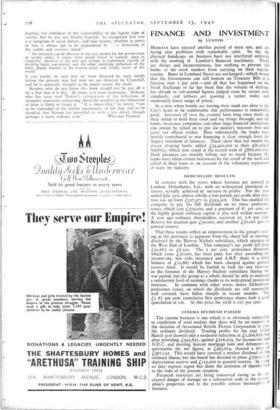FINANCE AND INVESTMENT
By CUSTOS
MARKETS have entered another period of stern test, and are facing new problems with remarkable calm. So far, the physical handicaps on business have not interfered seriously with the working of London's financial machinery. There are delays and inconveniences, but nothing to prevent the banks or the stock markets from carrying on their regular routine. Rates in Lombard Street are unchanged—which means that the Government can still borrow on Treasury Bills at a fraction over a per cent —and all that has happened on the Stock Exchange so far has been that the volume of dealings has shrunk to sub-normal figures judged even by recent poor standards, and jobbers are quoting a rather wider and moderately lower range of prices.
At a time when bombs are leaving their mark too close to the City's heart to be comfortable this performance is remarkably good. Investors all over the country have long since made up their minds to hold their stock and see things through, and the banks, insurance companies and other large financial institutions can always be relied on to put the nation's interests first and carry out official wishes. How substantially the banks have latterly contributed to war financing is clear enough from the August statement of balances. These show that last month the eleven clearing banks added £24,400,000 to their gilt-edged holdings, which now stand at the record total of £682,2d0,000. Bank advances are steadily falling, not so much because the banks have taken certain borrowers by the scruff of the neck and called in their loans as on account of the voluntary repayment of loans by industry.
DEBENHAMS' RESULTS
In contrast with the stores whose fortunes are centred in London, Debenhams, Ltd., with its widespread provincial in- terests, actually achieved an increase in profits. For the year ended July 31st, almost wholly a war period, net profit after taxa- tion was up from £527,371 to £533,316. This has enabled the company to pay the full dividends on its three preference issues, which cost £379,000, and a payment of 8+ per cent. on the highly geared ordinary capital is also well within earnings. A year ago ordinary shareholders received 20 5-6 per cent. Reserve for taxation gets £50,000, and another £50,000 goes to general reserve.
That these results reflect an improvement in the group's trad- ing in the provinces is apparent from the sharp fall in earnings disclosed by the Harvey Nichols subsidiary, which operates in the West End of London. This company's net profit fell from £51,683 to £6,320. The 5 per cent. preference dividend, which costs £30,000, has been paid, but after providing for income-tax, war risks insurance and A.R.P. there is a debit balance of £15,867 which has been charged against general reserve fund. It would be foolish to look for any recovery in the fortunes of the Harvey Nichols subsidiary during the war period, but the group as a whole should be able to maintain a satisfactory level of earnings thanks to its widespread provincial interests. In common with other stores shares Debenhams preference issues, on which the dividends are still reasonably well covered, have fallen sharply in recent months. The LI 61 per cent. cumulative first preference shares look a good speculation at 12s. At this price the yield is 0+ per cent.
CINEMA DIVIDEND PASSED
The cinema business is one which is so obviously vulnerable to conditions of total warfare that there will be no surprise at the decision of Associated British Picture Corporation to pass the ordinary dividend. Trading profits for the year ended March 31st showed only a moderate reduction at £1,206,858. but after providing £395,831, against £216,103, for income-tax and N.D.C. and meeting heavier mortgage loan and debenture re- quirements the net figure, at £463,614, showed a drop of £367,137. This would have covered a modest dividend on the ordinary shares, but the board has decided to place L23o,0c) to depreciation reserve and £125,000 to general reserve. In doing so they express regret but draw the attention of shareholders to the risks of the present situation. Financial resources are being conserved owing to the in- creased danger of damage on a substantial scale to the corpor- ation's properties and to the possible serious interruption of business.


























 Previous page
Previous page